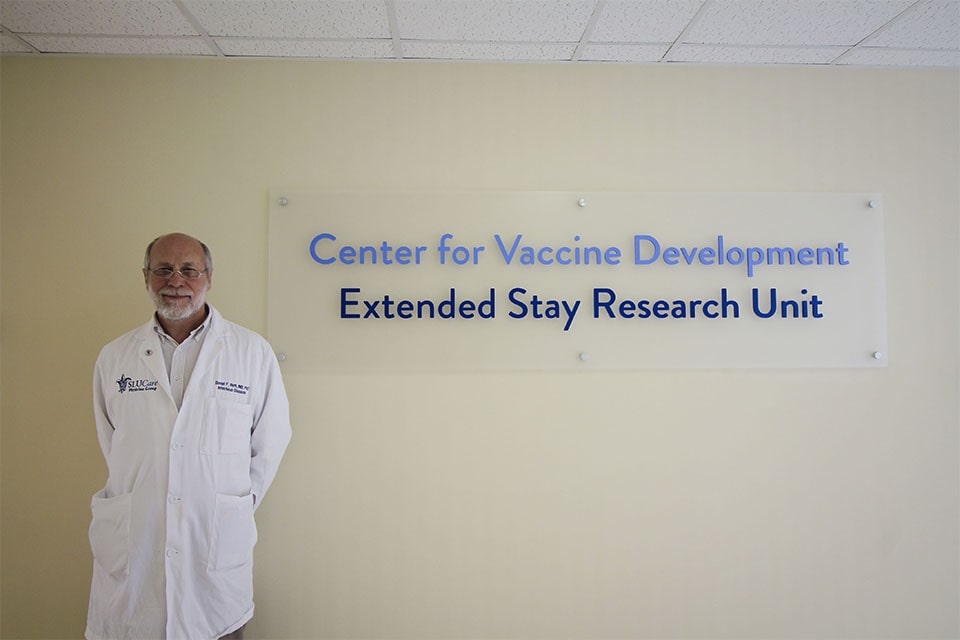Influenza Human Challenge Study Begins at NIAID-Sponsored Clinical Trial Units
A clinical trial in which healthy adults will be deliberately infected with influenza virus under carefully controlled conditions is recruiting volunteers at four Vaccine and Treatment Evaluation Units (VTEUs) supported by NIH’s National Institute of Allergy and Infectious Diseases (NIAID).
One study aim is to assess how levels of pre-existing influenza antibodies impacts the timing, magnitude and duration of a volunteer’s flu symptoms following exposure to influenza virus.
The first doses of challenge virus were administered to five volunteers earlier this week. Up to 80 people aged 18 through 49 years will be enrolled in the trial. The study builds on recent work by scientists in the NIAID Laboratory of Infectious Diseases to develop a model of influenza disease with controlled human infection studies.
“NIAID investigators have been pioneers in contemporary human influenza challenge trials,” said NIAID Director Anthony S. Fauci, M.D. “These trials provide a powerful tool to study many aspects of influenza disease progression and also can help to efficiently assess new treatments and vaccine candidates.”
He added: “Expanding the capacity to perform human challenge trials is a key goal in NIAID’s strategic plan to support the development of vaccines that confer broad and durable protection against influenza. This new trial at the VTEUs will help us achieve that goal.”
Volunteers will receive a nasal spray containing a strain of seasonal influenza virus made under good manufacturing practice conditions. The challenge virus, InfluenzaA/Bethesda/MM2/H1N1, was developed by NIAID scientists and reliably produces mild to moderate influenza disease in most recipients. It has been administered to approximately 400 participants in four previous influenza challenge trials conducted at the NIH Clinical Center in Bethesda, Md. No significant safety issues or severe or complicated cases of influenza have occurred, and no transmission of the virus outside of the clinic was seen during the earlier trials.
In the current trial, volunteers will remain in the clinic for at least seven full days after being challenged with the virus. Blood samples and nasal and throat swabs taken before and periodically after viral challenge will be used to trace the initiation, size and duration of various immune system responses, and to detect virus shedding. The appearance and resolution of flu symptoms, such as fever and muscle aches and weakness, will be recorded daily by the volunteers and study staff for a total of 14 days after the virus challenge. All volunteers will be followed for approximately 90 days post-challenge and will have additional blood and nasal wash samples taken at several follow-up clinic visits.
Preliminary trial results are expected in May 2020.
The lead VTEU site is the University of Maryland School of Medicine, Baltimore, where Kathleen Neuzil, M.D., is principal investigator. Other VTEUs conducting the trial, and lead investigators at each, are:
- Cincinnati Children’s Hospital Medical Center (David Bernstein, M.D.)
- Duke University (Christopher Woods, M.D.)
- Saint Louis University Center for Vaccine Development (Daniel Hoft, M.D., Ph.D.)
Additional information about the trial, H1N1v Virus Challenge Study in Healthy Subjects, is available at clinicaltrials.gov using the identifier NCT04044352.
To learn more about this research at Saint Louis University, visit vaccine.slu.edu or call (314) 977-6333.
NIAID conducts and supports research—at NIH, throughout the United States, and worldwide—to study the causes of infectious and immune-mediated diseases, and to develop better means of preventing, diagnosing and treating these illnesses. News releases, fact sheets and other NIAID-related materials are available on the NIAID website.
About the National Institutes of Health (NIH): NIH, the nation's medical research agency, includes 27 Institutes and Centers and is a component of the U.S. Department of Health and Human Services. NIH is the primary federal agency conducting and supporting basic, clinical, and translational medical research, and is investigating the causes, treatments, and cures for both common and rare diseases. For more information about NIH and its programs, visit www.nih.gov.
About Saint Louis University School of Medicine: Established in 1836, Saint Louis University School of Medicine has the distinction of awarding the first medical degree west of the Mississippi River. The school educates physicians and biomedical scientists, conducts medical research, and provides health care on a local, national and international level. Research at the school seeks new cures and treatments in five key areas: infectious disease, liver disease, cancer, heart/lung disease, and aging and brain disorders.


















